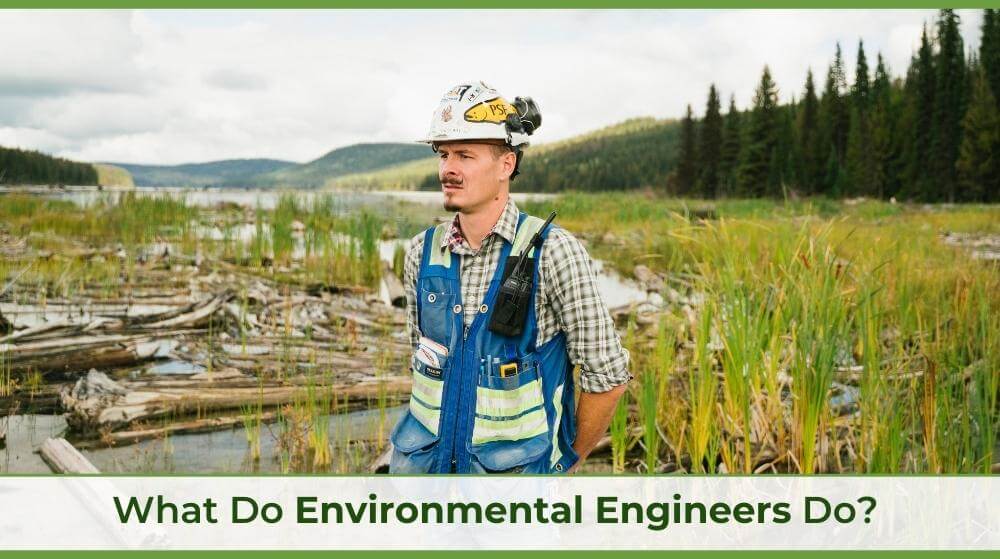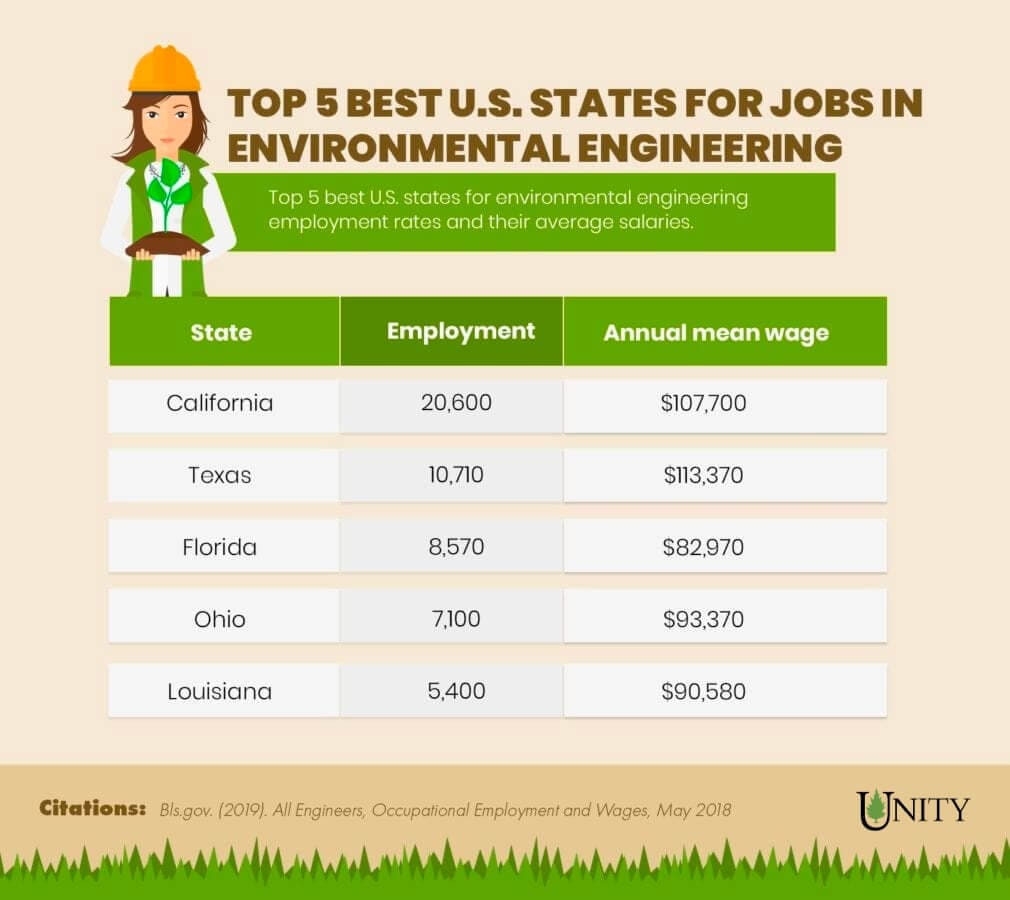
Our society wouldn’t be the same without manufacturing and mining; however, these things create a lot of pollution. Environmental engineers, also known as sustainability engineers, are involved in maintaining and updating procedures, improving public health, and improving waste disposal.
This guide will cover:
Unity Environmental University can help you on your journey to becoming an Environmental Engineer.

When you become a sustainability engineer, you’ll be a part of the clean energy industry. You will work with clients to meet their goals while reducing or eliminating an environmental impact. Learn what an environmental engineer does and what a future in the career might hold.
|
Career Path Overview for Environmental Engineer |
|
|
Education Requirements |
4-year B.S. degree |
|
Recommended Degree Program |
BS in Environmental Engineering |
|
Average Salary (2023) |
$100,090 |
|
Workers Employed in U.S. (2022) |
47,300 |
|
Projected Job Openings by 2032 |
2,900 |
|
Projected Growth Rate |
6% (Faster than average) |
|
Other Job Titles |
Sustainability Engineers, Pollution Control Engineers |
|
Related Careers |
|
Source: Bureau of Labor Statistics
What is an Environmental Engineer?
Environmental engineering is the branch of engineering that protects others from harsh environmental effects, such as pollution. This specialist engineer strives for a cleaner environment by using biology, soil science, and chemistry.
Sustainability engineers use chemistry, mathematics, and biology to prevent hazards from impacting the environment. These technicians prepare, update, and maintain environmental investigation reports and plans. They also analyze data, perform inspections, monitor progress, and design projects that aid in protecting the environment. Some are even involved in toxic clean-ups.
What Does an Environmental Engineer Do?
Environmental engineer tasks and responsibilities vary. General tasks include:
- Overseeing pollution control and waste management activities
- Staying up-to-date with water, waste, and air regulations
- Generating environmental reports
A junior environmental engineer does a lot of the fieldwork like surface water, soil, and groundwater sampling and air monitoring. A senior environmental engineer leads several different projects for their organization. They are focused on doing tasks like reviewing designs and solving environmental health and safety issues. Both roles need to rely on a team of people to aid in solutions to environmental changes.

Where Do Environmental Engineers Work?
A day in the life of an environmental engineer usually includes being in an office with other engineers. However, they also travel to sites to gather samples. Some research in an industrial plant, while others research in a lab. Needless to say, the sustainability engineer work environment can vary greatly.
Most sustainability engineers work a regular 40-hour week. However, deadlines and projects may bring extra stress, causing some engineers to work more hours. Environmental engineering career paths may lead to employers from different industries including consulting engineering firms, government and regulatory agencies, and non-profit environmental organizations.
In the Office
Sustainability engineers usually work in offices with other engineers, urban and regional planners, and other business people. They use computers to analyze scientific data and do quality control checks. They are sometimes required to present their findings to higher ups and at conferences.
In the Field
When working with hazardous materials removal workers, engineers are working at worksites outside. They evaluate an environmental hazard by taking samples and assessing the environment at the worksite. This data is then analyzed back in an office setting.
Average Environmental Engineer Salary
Those looking to pursue a career in their field may be wondering: How much do environmental engineers make? According to the BLS in May 2023, the median salary for an environmental engineer was $100,090.
Different factors can change your base pay, including location, employer, years of experience, and degrees. Overall, sustainability engineering is a high-paying environmental career. The lowest 10 percent of sustainability engineers earn $59,820, while the highest 10 percent earn $153,200.
What is the Environmental Engineer Job Outlook?
The employment of environmental engineers is reported to increase by four percent in the next ten years. The sustainability engineering career outlook is growing at a lower average rate. Opportunities are likely to still increase as more and more companies are “going green,” which is, in turn, creating a stronger market for this career.

How to Become an Environmental Engineer: Educational Qualifications
One may ask, “Is environmental engineering hard to get into?” Typically, the minimum education level employers look for in a candidate is a relevant college degree – usually at least a bachelor’s. You may want to earn your master’s in environmental engineering to advance into a senior-level position. Others may consider an environmental engineering graduate program like a Ph.D. or doctorate.
How long does it take to become an Environmental Engineer?
The first step in becoming an engineer is getting your bachelor of environmental engineering – which typically takes about four years. It is strongly encouraged for ambitious young professionals to get their master’s degree. Some accredited training programs offer a five-year educational program to obtain a Master’s degree. It’s not required, but it is encouraged.
Environmental Engineering Master’s programs will take about 1 to 3 years to complete, and a doctoral degree will take about five to six years to complete. Most positions look for at least four years of relevant work experience to advance to the senior level.
Environmental Engineer High School Recommendations
While it may be High school students who are interested in this profession should take classes including:
- Biology
- Mathematics, including Algebra, Trigonometry, and Calculus
- Physics
- Chemistry
Finding a high school internship is important, too. This helps you to get a little more experience in the field and learn firsthand interesting facts about environmental engineering. It also looks great on a resume. Environmental engineering internships for high school students can also allow you to figure out if this is the field you truly want to go into.
Related Degrees
When it comes to choosing between environmental engineering courses, there are many options to consider. You can even enroll in an online environmental engineering degree program. There are many options for choosing an environmental engineering major.
Some recommended environmental engineering programs include:
- BS in Environmental Engineering: The Environmental Engineering program focuses on designing, developing, and implementing systems that protect and enhance both human health and the environment. It tackles critical issues like air and water quality, waste management, and sustainable development. By integrating principles from engineering, environmental science, and sustainability, this program prepares learners to create innovative solutions that address the environmental challenges of today and tomorrow.
- BS in Sustainable Business Management: Renewable Energy: With a heavy emphasis on experiential and outdoor learning, having studies at all college learning levels, and small lab sections taught by nationally recognized professors, this program equips students with the skills needed to solve the world’s most pressing environmental problems.
Additional Certifications and Licenses
Typically, entry-level sustainability engineering requirements don’t include any specific licenses. A necessary license for higher levels of leadership is a Professional Engineering license (PE). Licensures typically require a passing score on the Fundamentals of Engineering (FE) exam, generally four years of relevant work experience, and a degree from an ABET-accredited engineering program.
- PE Licensure (NSPE): The NSPE provides its members with information and resources they need to earn and maintain the PE seal, whether they are already licensed or soon-to-be licensed.
- FE Exam (NCEES): The FE is typically the first step in becoming a licensed professional engineer (P.E.). It’s for recent graduates who are close to finishing an undergraduate engineering degree from an EAC/ABET-accredited program.

Start Your Career in Environmental Engineering with Unity Environmental University
Environmental engineering is a high-demand environmental science job that is high paying and leaves a positive environmental impact. Unity Environmental University can help you get started on your journey to becoming a sustainability engineer.
You can also learn about more environmental careers that include working with animals, the ocean, sustainable businesses, and more at Unity Environmental University.
We can help you find the right career path for you and the right degree program to get you there. So whether you want to work outdoors among plants and animals or in a lab solving real-world problems, it all starts with a degree from Unity Environmental University.
